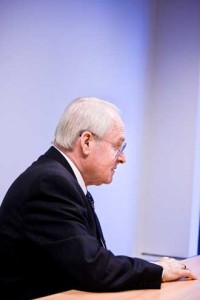
By Chris Chipello
“Corporations are not really interested in hiring specialists,” said McGill benefactor Marcel Desautels in a recent interview at the Desautels Faculty of Management’s Sherbrooke St. building. “They want people who are broad-minded, who are going to look at every facet of a problem.” That’s why the Faculty’s revised MBA program features a core curriculum that cuts across the boundaries of functional disciplines, such as finance, accounting and marketing.
Further developing this kind of big-picture approach to business education will be the mission of the new Marcel Desautels Institute for Integrated Management. The new MBA program and the institute were officially launched at ceremonies earlier this month.
“We call the traditional disciplines silos,” said Mr. Desautels. “We talk about breaking down the silos” – about getting professors to work together to consider all aspects of a business problem as they develop courses, rather than focusing on their own narrow areas of specialization.
“In a corporation, if you’re trying to solve a business problem you don’t want just finance people bringing their expertise and their point of view to the solution of the problem,” said Mr. Desautels, a former corporate executive who has become a leading patron of management education in Canada. “You want marketing involved, you want accounting involved, you want all the different constituencies” to contribute.
Beyond breaking down the silos, Mr. Desautels wants to see more emphasis on teaching students how to think in an “integrative” way.
“I went to a Jesuit college,” said the native of St. Boniface, Manitoba. “I studied logic and philosophy and other courses which teach the art of deductive reasoning. But you don’t get that in high schools today” – though McGill is “very fortunate” to draw undergraduate students with the highest
collective grade point average in Canada.
At the MBA level, most students already have five or six years of working experience under their belts and are pursuing advanced education because they aspire to posts in senior management, Mr. Desautels noted.
”If we’re going to train senior managers, we have to give them the tools. It’s not just a matter of learning more about marketing, more about accounting. That’s just information. That doesn’t help you to become a better decision-maker,” he said. “It’s more knowledge, for sure – but you need more than that.” The turmoil currently sweeping global financial markets highlights the need for broad-minded business leaders, he added.
Bringing fresh thinking to business education has become a passion for Mr. Desautels, who long headed Creditel of Canada Ltd., a commercial-credit reporting bureau that grew to serve more than 12,000 corporations across Canada. When the firm was sold, he became president of a private charitable foundation formed with its assets. Called the Canadian Credit Management Foundation, it supports higher education, particularly through the endowment of scholarships and chairs in faculties of management.
The CCMF made major contributions to the University of Toronto Rotman School of Management and other universities before its landmark $22 million gift to McGill in 2005 – at the time, the largest donation ever made to a Canadian business school. Mr. Desautels joined the McGill Desautels Faculty of Management Advisory Board in January 2006. In 2008, he provided a further $10 million to create the Institute for Integrated Management.
In the coming months, a McGill search committee will seek a director for the new institute. Once that person is in place, “it’s my hope that he’ll be involved in developing curriculum” to foster “integrative thinking,” Mr. Desautels said. “I believe that’s going to be the cutting edge of business education.”
